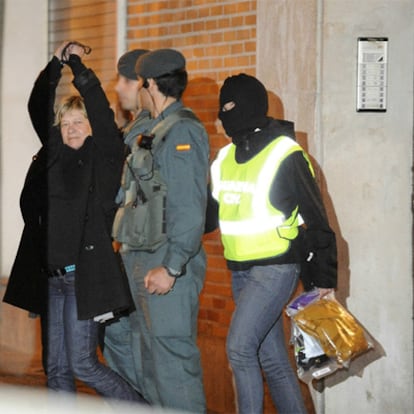The ETA attorney on the wrong side of the law
Arantza Zulueta asked by terrorists for High Court floor plan to help with bomb attack
Over the past two decades, Arantza Zulueta has been hauled off to jail on at least three occasions for her alleged connections to ETA. Wednesday saw her latest arrest.
Authorities say they found a letter in her office from the Basque terrorist group asking her for a floor plan and descriptions of the High Court to be used to help it carry out an attack.
"When you can, give us a report about the High Court," reads the missive that was found in a host of documents confiscated from her office on April 14, 2010, when she was arrested on another occasion for allegedly serving as an intermediary for ETA. A copy has been seen by EL PAÍS.
The document asks for information on "the security measures at both entrances, what they ask for, what the metal detectors are like (whether you have to leave your keys in one place before you can pass through the detector); what is on each floor; once you are inside, are you free to move around or does someone control where you go; what are the bathrooms like, and do judges have separate facilities; what type of control do the txakurras [which means 'dogs' in Basque, and is a term used by ETA in reference to the police] have; what type of ID do they ask for; what card will we need to enter; which door would be the best to enter; can we use the elevator; if we undertake an ekinstza [action], where would be the best place to leave the explosives]."
In the letter, the terrorist band treats Zulueta as if she were another member of the group, and a key resource in breaking the security measures at the High Court.
Authorities also found maps and diagrams to three secret hiding places in France. On Tuesday, the French police discovered weapons, $20,000 in cash and explosives in one of these located in a forest near Saint-Jean-Pied-de-Port in the Pyrenees.
A native of Lekeitio (Vizcaya), Zulueta is a prominent lawyer for the Basque abertzale radical left, having defended various ETA and Batasuna members, including Arnaldo Otegi, the former leader of ETA's outlawed political wing, on several occasions.
Zulueta was arrested in 1993 along with Batasuna lawyer Txemi Gorostiza on charges that she participated in a jail-house conversation with ETA inmates, including Iñaki de Juana Chaos,on how to attack prison officials. She was released on bail and never brought to trial; Gorostiza was tried and acquitted.
Besides Otegi, whom she defended in 2006 on charges of instigating violence during a strike and a march called by the abertzale, Zulueta has represented other ETA members, including a young man who was convicted in 2005 of throwing Molotov cocktails at a police vehicle with two officers inside.
Outside the courtroom, Zulueta has participated in public demonstrations with former leaders of Batasuna in support of ETA prisoners.
When she was arrested last year for alleged ETA ties, along with three other lawyers, a professor and a Basque labor union leader, cameras caught her as she was being led away by police throwing her handcuffed arms in the air in defiance.
Zulueta also went on a hunger strike last year while in preventive custody. After her arrest last Wednesday, she was freed on bail. High Court Judge Fernando Grande-Marlaska has opened another investigation against her for alleged participation in "revolutionary tax" schemes, which attempt to extort funds from Basque businesses.
Anti-terrorism investigators say Zulueta is the head of ETA's prison inmate group, EPPK, and point out that she was one of the few abertzale figures who did not sign the Gernika Accord in September, which was drafted by Basque radical left parties and called for a permanent and verifiable ETA ceasefire.

Tu suscripción se está usando en otro dispositivo
¿Quieres añadir otro usuario a tu suscripción?
Si continúas leyendo en este dispositivo, no se podrá leer en el otro.
FlechaTu suscripción se está usando en otro dispositivo y solo puedes acceder a EL PAÍS desde un dispositivo a la vez.
Si quieres compartir tu cuenta, cambia tu suscripción a la modalidad Premium, así podrás añadir otro usuario. Cada uno accederá con su propia cuenta de email, lo que os permitirá personalizar vuestra experiencia en EL PAÍS.
¿Tienes una suscripción de empresa? Accede aquí para contratar más cuentas.
En el caso de no saber quién está usando tu cuenta, te recomendamos cambiar tu contraseña aquí.
Si decides continuar compartiendo tu cuenta, este mensaje se mostrará en tu dispositivo y en el de la otra persona que está usando tu cuenta de forma indefinida, afectando a tu experiencia de lectura. Puedes consultar aquí los términos y condiciones de la suscripción digital.








































